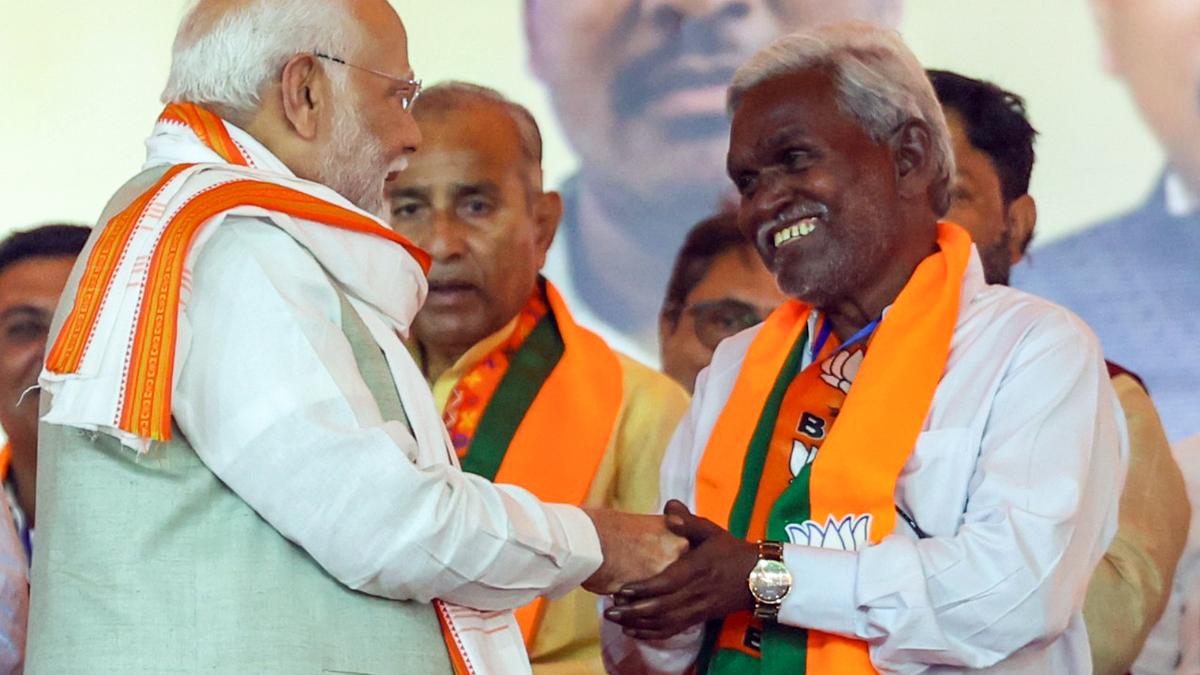Prime Minister Narendra Modi and former Jharkhand CM and BJP candidate from Seraikela constituency Champai Soren greet each other during an election meeting in Chaibasa on November 4, 2024. Photo:narendramodi.in via ANI
In the quaint village of Dudhi, on the outskirts of Seraikela town, 28-year-old Bhagirathi Mahto sits by the irrigation canal that has been running dry for years now. A Class 12 pass, Mr. Mahto says he has been waiting for government job vacancies but to no avail. “In 2019, I was roaming around the area campaigning for Champai Soren. But this time both major candidates have made such spectacular switches that maybe the villagers will also surprise everyone,” he tells The Hindu, his lips curling into a smirk.
As southern Jharkhand prepares to vote in the first phase of the Assembly election, one of the most-watched battlegrounds has emerged in Seriakella, a seat Mr. Soren has turned into his stronghold over the last two decades; and from where he became instrumental in shaping the Jharkhand Mukti Morcha’s politics as one of the party founder Shibu Soren’s protege. In these polls, however, Mr. Soren is fighting on a Bharatiya Janata Party ticket after being removed from the Chief Minister’s post “insultingly”, as he has claimed.
Switching sides
His main opponent is Ganesh Mahali, a long-time BJP politician, whom Mr. Soren had defeated in the 2014 and the 2019 Assembly elections — by a razor-thin margin of 1,000 votes first and then by a margin of about 15,000 votes. This time though, Mr. Mahali is contesting as a JMM member.
“We have been hearing a lot about youth getting jobs under contractors close to Ganeshji at least. These are not government jobs but still it is something,” said Mr. Mahto, who now works on his family’s paddy fields owing to lack of work. “Champai, on the other hand, has been good, but we cannot see anything that he has brought to our village. The people he has helped, he has done so with cash whenever they needed but that is not the same as giving people jobs.”
Dudhi village is largely consisting of Adivasi families — mostly from the Santhal and Ho communities, and the Mahto community — which is categorised as Other Backward Class (OBC) in Jharkhand. Apart from this, the village is dotted with half-a-dozen upper caste households, roughly representing the demography of the Scheduled Tribe majority seat of Seraikella, which is voting on November 13.
Mr. Mahto’s enthusiasm for Mr. Mahali’s efforts to provide jobs is resonated in Seraikela town as well, which has a significantly higher population of General category households. “Champai is well-regarded sure. But what has he really done for the area apart from helping people in personal difficulties?” asked Gopal Mandal, 40, who has been cooking at an eatery in the town centre all his life.
Champai’s pitch
Across Seraikela, Mr. Soren has been campaigning on the back of decisions he had taken as CM for five months — jumpstarting job recruitments, bringing tribal language education in primary schools. In addition to this, he has been speaking of the “insult” to him and by extension to the Adivasi people, referring to his removal as CM. On the other hand, Mr. Mahali is focusing on appealing to the youth with jobs, advertising the JMM-led government’s efforts to start recruitments in the last five years.
In Dudhi, 30-year-old Palwant Soren, who also works on his family’s paddy field like most others in the village, said: “The principal problem here has been water for the last few years. The irrigation canal was built about five-six years ago but there is no water, the soil is going from bad to worse every year.” Seraikella sits on the edge of the industrial hub of Jamshedpur. “Our families here have always relied on Champaiji. But this time, all we hear is confusion in every household. We are yet to have a community meeting to decide what to do,” Mr. Palwant said.
The confusion Mr. Palwant is speaking of in Adivasi households residing in Dudhi is mirrored in Mangudih of Pathanmara gram panchayat, about 30 km south, which is a Ho-dominated village. “I remember the day Champai left us and went to BJP. There was confusion in all 17 villages of Pathanmara about why he would do this. The confusion persists,” 28-year-old Sunita Honhaga of Mangudih said, adding, “It is very difficult for us now.”
Ms. Sunita explained that Champai Soren had always been with them in times of happiness and sorrow. “Every time a child is born, or someone dies in the family, he would always send his regards or condolences. He has helped so many of us with money when we were in dire straits.”
“But at the same time, our community is inextricably linked to the symbol of teer dhanush (bow and arrow — the JMM’s symbol). We have a practice of placing the symbol at the head of the cot when a child is born in the family. There is a sense of hurt among some of us obviously,” added Sunita, who is among the over 45 lakh women who have received instalments of the JMM-led government’s cash assistance scheme for women. But she maintained, “There is so much work that the village needs. Lights do not work, there is no steady water supply in all homes.”
Published – November 10, 2024 02:48 am IST






